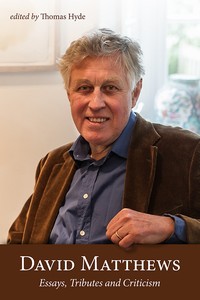 |
Return to previous page | david-matthews.co.uk |  |
|
|||||||
 |
|||||||
|
The news archive contains details of: 2014
|
David Matthews: Essays, Tributes and CriticismEdited by Thomas Hyde, Plumbago Books, 2014, 320pp.  Following David's 70th birthday in 2013, this collection marks the occasion by beginning with all of his important essays and reviews to date. These survey the present music scene, discuss symphonists (notably Mahler and Sibelius) and focus on individual composers (in particular Britten and Tippett). By including extracts from David's journal and letters, Thomas Hyde's substantial editorial notes sketch out an accompanying biography. This is supplemented by extended memoirs from Roger Scruton and Peter Sculthorpe, and a collection of tributes by James Francis Brown, the Smirnov family, Robin Holloway, Colin Matthews, John McCabe, and others. The third part offers a critical forum on David's music, beginning with an overview by Malcolm MacDonald and followed by essays on David's works written by Arnold Whittall, Edward Venn, Geraint Lewis, Hugh Wood and the editor. Frank Ward concludes with a witty epilogue. Review: Richard Whitehouse, Gramophone, November 2014The recorded coverage of David Matthews has become one of the most significant aspects of British contemporary music this past decade, confirming his substantial output as having few equals in terms of its eliding of tradition and innovation with an assurance matched by few of his peers - British or otherwise. That he remains a still underestimated figure (though no one should underestimate the principled tenacity with which Matthews has fought the corner of classical composers, notably their relevance in what is an increasingly indifferent and often hostile era) reflects his status as a composer who has strategically avoided both modernist and populist traits, intent rather on pursuing a creative path which has gained in expressive depth as surely as it has gained in formal (and, the composer would doubtless attest, tonal) clarity. Issued to mark his 70th birthday, the present book is the first to be devoted to his music and its symposium format surveys the extent of Matthews's achievement not only in composition. Thus the first section takes in selected essays such as underline the breadth of his concerns - including numerous book reviews (Matthews has long been a mainstay of the Times Literary Supplement) and thoughts on those who helped shape his own identity. While Matthews on himself needs be taken advisedly (almost by definition, composers are seldom their own best judges, however well-reasoned their assessments might be), his observations as to working with Deryck Cooke on the latter's performing version of Mahler's Tenth Symphony, or of his visiting Mahler's birthplace and formative environs in what was then an inaccessible corner of communist Czechoslovakia, come as a salutary reminder of the composer's still recent rise to eminence; while those on the Sibelius tradition (as has latterly come to the fore in his own symphonic writing) or on Britten's late works underline the crucialness of such nominally disparate sources to the all-round richness of Matthews's own music. As the author of surely the best introductory monographs on both Britten and Tippett, and one able to evaluate the very different achievements of such as Berthold Goldschmidt or Bob Dylan, Matthews could have been (but fortunately has chosen otherwise) as substantive a writer as he is a composer. After a second section which consists of tributes ranging from Paul McCartney's breezy salutation to the late Peter Sculthorpe's thoughtful reminiscences on their collaborations 'down under', as well as musical miniatures by composers including Judith Weir and James Francis Brown, the third and longest section has a range of critical evaluations. The late Malcolm MacDonald surveys the extent of Matthews's output in typically perceptive terms, while Arnold Whittall examines the Sixth and Seventh Symphonies with an objectivity and finesse absent from more partisan commentaries. Edward Venn traces the evolution of Matthews's thinking through the single-movement format of four of the symphonies, then Geraint Lewis provides a more informal yet highly pertinent overview of the symphonic poems and concertos. By his own admission a recent convert to Matthews, Hugh Wood casts an insightful and not uncritical eye over the Eleventh and Twelfth String Quartets - as well as a retrospective glance at the Third which he (rightly) considers to be an unacknowledged masterpiece. Finally, Thomas Hyde - who has edited this book's content with astute thoroughness - considers the function of melody and its corresponding context on a composer whose concern for what he himself terms the vernacular has continued to inform his thinking in ever more focused and productive ways. As an irreverent though by no means irrelevant envoi, Frank Ward brings his connoisseurship of wine to bear on the individual characters of each of Matthews's seven symphonies (though one wonders if Australasian rather than French and a solitary Austrian wine might have been even more appropriate). The volume is rounded off with a list of selected works (omitting just a handful of early opuses and almost all of his numerous arrangements), a not quite complete discography (inevitable given the rapidity with which new recordings have been appearing) and a bibliography of Matthews's writings - the more valuable now that an increasing number of articles and reviews from however far back can be accessed online. It amounts to a finely assembled and engrossing tribute to a composer whose creativity shows no signs of abating (his Eighth Symphony is due to be premiered in Manchester next spring), and that wears its academic credentials with deftness and not a little understatement. As such, it could scarcely be a better complement to the vitality of Matthews's music - never more needed than now. |
||||||
 | |||||||
| Copyright on all site content held by David Matthews ©2025 | |||||||